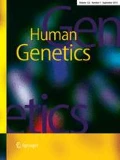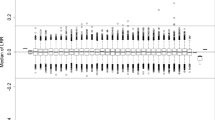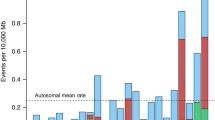Abstract.
The incidence of skewed X-inactivation in normal women is controversial, with up to 10-fold differences being reported by different authors. In order to clarify this issue, we have conducted a survey of the X-inactivation patterns in 270 informative females from various age groups, using the androgen receptor gene/polymerase chain reaction assay. Results obtained by using DNA extracted from blood samples show that the incidence of severe skewing (defined here as ratios ≥90:10) is relatively common and increases with age (P<0.05), occurring in 7% of women under 25 years of age, and 16% of women over 60. In order to study tissue-specific patterns of X-inactivation, samples of both buccal and urinary epithelia were also obtained from 88 of the females studied. Although there was a significant association of the X-inactivation ratios between each tissue in most individuals, wide variations were apparent in some cases, making accurate extrapolations between tissues impossible. The degree of correlation between each tissue also fell markedly with age. Our data are consistent with the hypothesis that the major factors in the aetiology of skewed X-inactivation are secondary selection processes.
Similar content being viewed by others
Author information
Authors and Affiliations
Additional information
Electronic Publication
Rights and permissions
About this article
Cite this article
Sharp, A., Robinson, D. & Jacobs, P. Age- and tissue-specific variation of X chromosome inactivation ratios in normal women. Hum Genet 107, 343–349 (2000). https://doi.org/10.1007/s004390000382
Received:
Accepted:
Issue Date:
DOI: https://doi.org/10.1007/s004390000382




